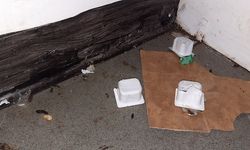"We have a national emergency," Health Minister Onyebuchi Chukwu told reporters Wednesday after the weekly cabinet meeting in Abuja. "We have a national emergency," Health Minister Onyebuchi Chukwu told reporters Wednesday after the weekly cabinet meeting in Abuja. "The Nigerian experience had alerted the world because every country is connected by flights," said Chukwu. "Indeed, everyone in the world is at risk. Nobody is immune," he added. The minister said the government has put in place measures to contain the spread of the virus in a country notorious for poor medical infrastructure. Ebola, a contagious disease for which there is no known treatment or cure, has been responsible for the death of hundreds in Guinea, Liberia and Sierra Leone. At least 887 people are believed to have died from the deadly virus worldwide. Medical doctors say common symptoms of the tropical fever, which first appeared in 1976 in Sudan and the Democratic Republic of Congo, include high fever and headaches, followed by bleeding from openings in the body.
As anxiety mounts over the fate of the remaining six persons confirmed to have contacted the virus in Lagos, authorities said they have formally requested the U.S. to supply Nigeria with ZMapp, the trial drug said to have been administered to two Americans who had contracted the virus in Liberia.
"The government has written to the U.S. Centre for Disease Control to see if they could make the experimental drugs being used in treating the U.S. missionary doctors infected with the virus available to Nigeria," said Minister Chukwu.
He said the government has not yet received any response from the center.
Reports suggest that the conditions of the two medical missionaries, who had contracted the virus in Liberia, have improved and are in stable condition.
Minister Chukwu said, meanwhile, that the government is seeking the procurement of "isolation tents" which would be distributed to the country's 36 states and capital city.
"This becomes necessary as people are raising objections to housing patients close to their homes," he added.
The minister said each isolation tent costs roughly $125,000.
He added that the government has also set up a website (www.ebolaalert.org) and created a twitter handle (@ebolaalert) to facilitate national discussion on the deadly - and contagious - disease.
"The public is advised to avoid handshake as much as possible because the virus is contagious and infectious," said the health minister.
Ebola can be transmitted to humans from wild animals and also spreads through contact with the body fluids of an infected person or someone who has died of the disease.
A Nigerian nurse has died after contracting the deadly Ebola virus, becoming the second confirmed fatality in the African country.
"Yesterday, the first known Nigerian to die of Ebola was recorded," Nigeria's Health Minister Onyebuchi Chukwu told a news briefing in Abuja.
The Nigerian female nurse and at least five other medical personnel had contracted the virus while treating a Liberian patient who had died recently of Ebola.
"She was one of the nurses that attended to the Liberian," said Minister Chukwu.
He confirmed that Nigeria has now recorded seven confirmed cases of Ebola, including two fatalities.
"The other five cases are currently being treated at the Isolation Ward in Lagos," he explained.
Chukwu said all the Nigerians diagnosed were primary contacts of Liberian Patrick Sawyer who died of the disease on July 25 barely a week after arriving in Nigeria.
At least 70 people who came in contact with Sawyer had been placed on a watch list in a bid to curtail the spread of the deadly virus.
Ebola, a contagious disease for which there is no known treatment or cure, has been responsible for the death of hundreds in Guinea, Liberia and Sierra Leone.
According to WHO figures, Liberia registered 117 confirmed Ebola deaths, 97 probable deaths and 41 suspected deaths until August 1.
The tropical fever, which first appeared in 1976 in Sudan and the Democratic Republic of Congo, can be transmitted to humans from wild animals and also spreads through contact with the body fluids of an infected person or someone who has died of the disease.
Medical doctors say common symptoms of Ebola include high fever and headaches, followed by bleeding from openings in the body.
Saudi man suspected of Ebola dies
The Health Ministry announced Wednesday the death of a Saudi man earlier quarantined for showing symptoms similar to those associated with the deadly Ebola virus.
In a statement, the ministry said the man had died of a heart attack.
The man had been quarantined after showing symptoms similar to those associated with Ebola following his return from Sierra Leone, a West African country ravaged by the deadly virus.
The Health Ministry said that it was working to identify people who had come in contact with the deceased.
Ebola, a contagious disease for which there is no known treatment or cure, can be transmitted to humans from wild animals and also spreads through contact with the body fluids of an infected person or someone who has died of the disease.
The tropical fever, which first appeared in 1976 in Sudan and the Democratic Republic of Congo, has killed hundreds of people Guinea, Liberia and Sierra Leone.
SADC ministers meet in S. Africa to discuss Ebola
Health ministers of the Southern African Development Community (SADC) are holding an extraordinary meeting in Johannesburg Wednesday to discuss ways of preventing the spread of the deadly Ebola virus, which is currently plaguing West Africa.
"The meeting will be attended and addressed by the National Institute for Communicable Diseases (NICD) and the World Health Organization (WHO)," said a statement by the South African Ministry of Health. The ministers are expected to develop common approach in response to the Ebola outbreak.









